Dental Implant in Morocco
Search and Compare the Best Clinics and Doctors at the Lowest Prices for Dental Implant in Morocco
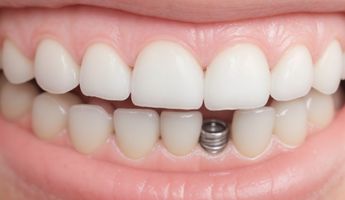
Find the best clinics for Dental Implant in Morocco
With Medijump you can browse 2 facilities offering Dental Implant procedures in Morocco. The cheapest price available is $695 in Marrakech. And for the cheapest price globally, prices start from $1 in Vietnam.
Dental Implant in Marrakech
Price: $ 695
Vietnam offers the best prices Worldwide
Price: $ 1
From 19 verified reviews
nait, 29 November 2019
Good experience, professional.
From 44 verified reviews
Saad Laalou, 16 March 2020
I have already done my care in this clinic and I highly recommend it, to one of the best dentists in Morocco Dr. MADANI, a vigilant doctor who masters his act from the beginning until the end of treatment with measurements and the precision required, a multidisciplinary clinic which adopts all the therapeutic fures of orthodontic esthetic prosthetics ... by adopting well on current dentistry (laser treatments, cfao ..) aiming at speed and excellence, a clinic which puts the concept of asepsis one of the big priorities always for the good progress of the act and the comfort of the patient, not to mention the staff of the clinic who are really nice, welcoming, and too adorable.
- Home
- Morocco
Compare Before & After Photos of _procedure_photos.phpDental Implant

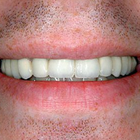
Front view


Front view
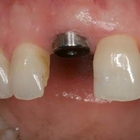
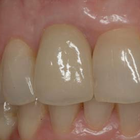
Front view
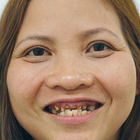

Front view
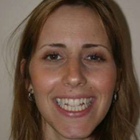
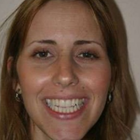
Front view
WHY US?
At Medijump, we're making medical easy. You can search, compare, discuss, and book your medical all in one place. We open the door to the best medical providers worldwide, saving you time and energy along the way, and it's all for FREE, no hidden fees, and no price markups guaranteed. So what are you waiting for?

Free

Best Price

Widest Selection

Risk-Free
What you need to know about Dental Implant in Morocco

A dental implant is a medical device that provide support to artificial teeth. It's surgically placed into the jaw to act as a replacement for the root of a missing or damaged tooth, which in turn serves to hold a replacement tooth or bridge. It functions and looks much like a real tooth, restoring your ability to chew and improves your overall appearance. Dental implant surgery is considered as a better alternative to dentures or bridgework that does not fit well. It also offers a great option for people when they do not have enough natural teeth roots left to build denture or bridgework replacements.
Since dental implants eventually fuse with your jawbone over the span of several months, it won’t make noise, slip, or cause bone damage the way dentures or bridgework might. Dental implants also enable natural speech, look and feel like your own teeth, make eating easier, and improves your appearance. However, the surgery may involve several stages, and, in some cases, it may require two separate visits to the clinic to complete. Ensure to look for a specialist in a reputable clinic for the best results.
What is the cost of Dental Implant in Morocco?
Price differences abound in Morocco for Dental Implant based on the clinic, the proficiency of the surgeon, and the individual requirements of the patients. It's essential to realize that dental insurance usually doesn't cover the entire bill for this treatment, though it might cover a part. Several dental clinics provide finance schemes or payment alternatives to assist in easing the financial burden. For more precise cost estimates, reach out to your dental service provider or a nearby clinic.
What does a Dental Implant Procedure Involve?
Dental implant surgery generally requires several stages. Each stage may be performed under general or local anesthetic. The first stage is removing the damaged tooth. Then, if your jawbone is too soft or not thick enough, your dentist may perform bone grafting to create a more solid base for the implant. The bone graft may be natural (taken from another part of your body) or synthetic (a bone-substitute material). If you only need minor bone grafting, the implant surgery can be performed on the same day. However, if you need a significant amount of bone graft, the implant surgery may have to be postponed until the transplanted bone grows enough new bone to support the dental implant.
The next stage after the damaged tooth removal and bone graft (if you need one) is placing the dental implant. To do this, your dentist makes an incision to expose the bone and puts the metal implant post deep into the bone. At this stage, you will still have a gap where your tooth is missing. Your dentist will place a temporary denture for appearance. Once the metal implant post is placed, osseointegration begins. This is a process where the jawbone grows into the surface of the implant and can take several months to complete. After osseointegration is complete, your dentist will place the abutment, which is a small connector post that will hold your new tooth. The final stage, after the abutment is placed, is placing the crown, which is the tooth-looking part. You can choose between a removable crown and a fixed crown.
How Long Should I Stay in Morocco for a Dental Implant Procedure?
The length of your stay in Morocco for a Dental Implant depends on numerous considerations like the intricacies of the procedure, the quantity of implants required, and your personal recovery process. Each stage of dental implant surgery is done in separate appointments. After each appointment, you should be able to leave the hospital or clinic right away. However, you should stay in Morocco for at least 2 weeks for completion of the work, the initial recovery time, and follow-up checkups.
What's the Recovery Time for Dental Implant Procedures?
The recuperation duration following a Dental Implant or dental implant operation can widely vary and is shaped by multiple aspects. Initial healing of the tissue might require only a handful of days, but complete osseointegration (the fusion of the implant with the jawbone) generally spans several months. This window could be extended for patients requiring auxiliary procedures such as bone grafts, or those with prevailing health issues that may impede the healing process.
Post-procedure, it's not unusual to experience a degree of discomfort, which could manifest as minor pain, swelling of your gums and face, skin and gum bruising, and slight bleeding. Such symptoms are a standard phase of the recovery process and should alleviate within a fortnight. In this interim, it's advisable to stick to a soft diet to not overload the implant site with undue pressure. Any strenuous physical exertion should be put off to circumvent potential complications.
Maintaining excellent oral hygiene is paramount to facilitate healing and stave off infection. Regular brushing and flossing, being particularly gentle around the surgical area, coupled with rinsing your oral cavity with warm saline water, can contribute to keeping the region hygienic.
What sort of Aftercare is Required for Dental Implant Procedures?
After each stage of surgery, you may have to eat soft foods. Since you may experience swelling, bruising, pain, and minor bleeding, your dentist will prescribe pain medications or antibiotics to help ease your discomfort. During your recovery period, you need to avoid smoking as it can contribute to implant failure and complications.
No special care is required for dental implants. Nonetheless, you need to practice good oral hygiene in order to maintain the implant and your remaining natural teeth. Make sure to brush your teeth twice a day, floss daily, and rinse your mouth with an antiseptic mouthwash. You also need to see your dentist regularly and avoid damaging habits, such as chewing hard items.
What's the Success Rate of Dental Implant Procedures?
The efficacy of Dental Implant, alternatively referred to as dental implants, in Morocco, is typically impressive, boasting effectiveness percentages as high as 98% in some studies. This positions dental implants as one of the most reliable procedures within dental care's realm. Nevertheless, it's worth mentioning that the success rates might fluctuate, influenced by several factors.
The patient's overall health is a key determinant of the thriving outcome of a dental implant procedure. Individuals exhibiting optimal health usually witness higher success rates. Pre-existing health issues like diabetes, osteoporosis, and periodontal ailments can theoretically impact the efficacy of the implant.
Additional contributing factors to the success rate encompass the quality and abundance of the individual's bone structure. Patients boasting plentiful, healthy bone are ordinarily the perfect candidates for dental implants. However, those who have experienced bone loss might need to undergo a bone grafting procedure before the implant procedure. This step can provide a robust base for the implant and enhance the chances of a successful result.
Are there Alternatives to Dental Implant Procedures?
If you are not a candidate for dental implant surgery, or you simply do not want to undergo the procedure, you can opt for the alternatives. The alternatives include:
- Mini dental implants, which is a small type of dental implants. The structure is similar to regular dental implants, but are somewhat smaller in size. Unlike regular dental implants, dentists can often place mini implants only in one visit using local anesthesia. You may also be able to use your new teeth on the same day.
- A same-day implant is essentially similar to traditional dental implants. However, your dentist performs the whole process in just one day, skipping the process of wound healing and osseointegration.
- Implant-supported dentures or All-on-4 is an alternative if you need to fix a complete upper or lower set of teeth. During this procedure, four to six implants are placed into your jawbone as a base to attach and stabilize your denture.
What Should You Expect Before and After the Dental Implant Procedure?
Grasping what lies ahead before and post the Dental Implant can lessen potential worries and guarantee you are fully equipped for the upcoming journey. Prior to the procedure, your dental practitioner will conduct an all-inclusive dental assessment. This check-up may encompass dental X-rays and sophisticated 3D imaging to examine the status of your oral cavity.
The dental professional will also explore your medical history. If you're suffering from specific heart disorders or orthopedic implants, your dental practitioner might suggest antibiotics to avert infection. A personalized treatment blueprint, customized to your circumstances, will be constructed. This strategy takes into account factors like the amount of teeth you need substituted and the state of your jawbone. The procedure is typically carried out under local anesthesia to mitigate any discomfort.
Subsequent to the operation, experiencing slight unease is usual. You might witness inflammation of your face and gums, discoloration of your skin and gums, soreness at the insertion area, and insignificant bleeding. Your dental specialist will recommend medications to soothe these indicators. In case inflation, unease, or any other complications intensify in the days post-operation, it's crucial to reach out to your oral surgeon. Post-operation will require you to consume mushy foods as the operated site recovers. Moreover, you'll be guided to abstain from smoking, as it can hinder recovery and influence the triumph of the dental implant.
Following the positioning of the implant, the healing process, and fusion with the bone (osseointegration) transpire over an extended period. During this interval, maintaining robust oral cleanliness is vital. This involves frequent brushing, the use of dental floss, and cleansing with an antibacterial mouthwash. Periodic dental examinations are obligatory to track progress and confirm the well-being and effectiveness of the implant.
What are Potential Risks of Dental Implant?
Despite Dental Implant boasting remarkable effectiveness, it is, as any surgical operation, not without risks and potential difficulties. The chances of encountering these issues are often minute and irregularities are infrequent, yet it remains critical for patients to comprehend these possibilities before undertaking the procedure.
Complications and side effects may include:
- Implant failure
- Nerve injury
- Infection
- Sinus problems
- Damage to surrounding structures, such as other teeth or blood vessels
How long does a Dental Implant last?
The durability of a Dental Implant is heavily reliant on the individual's oral cleanliness and general wellbeing. Nonetheless, with appropriate upkeep and care, dental implants have the potential to stand the test of time. The titanium pillar inserted into the jawbone during surgery is crafted to be everlasting, while the dental cap fastened to the anchor may necessitate substitution every decade or decade and a half due to normal usage. Yet, with outstanding dental management and habitual screenings, the cap has the potential for lifelong endurance.
Whilst the information presented here has been accurately sourced and verified by a medical professional for its accuracy, it is still advised to consult with your doctor before pursuing a medical treatment at one of the listed medical providers
No Time?
Tell us what you're looking for and we'll reachout to the top clinics all at once
Enquire Now

Popular Procedures in Morocco
Prices Start From $1

Prices Start From $1

Prices Start From $48

Prices Start From $1

Prices Start From $1

Prices Start From $11

Prices Start From $1

Prices Start From $45

Recommended Medical Centers in Morocco for Dental Implant

- Interpreter services
- Translation service
- Religious facilities
- Medical records transfer
- Medical travel insurance
- Health insurance coordination
- TV in the room
- Safe in the room
- Phone in the room
- Private rooms for patients available

- Interpreter services
- Translation service
- Religious facilities
- Medical records transfer
- Medical travel insurance
- Health insurance coordination
- TV in the room
- Safe in the room
- Phone in the room
- Private rooms for patients available

- Interpreter services
- Translation service
- Religious facilities
- Medical records transfer
- Medical travel insurance
- Health insurance coordination
- TV in the room
- Safe in the room
- Phone in the room
- Private rooms for patients available

- Interpreter services
- Translation service
- Religious facilities
- Medical records transfer
- Medical travel insurance
- Health insurance coordination
- TV in the room
- Safe in the room
- Phone in the room
- Private rooms for patients available

- Interpreter services
- Translation service
- Religious facilities
- Medical records transfer
- Medical travel insurance
- Health insurance coordination
- TV in the room
- Safe in the room
- Phone in the room
- Private rooms for patients available

- Interpreter services
- Translation service
- Religious facilities
- Medical records transfer
- Medical travel insurance
- Health insurance coordination
- TV in the room
- Safe in the room
- Phone in the room
- Private rooms for patients available

- Interpreter services
- Translation service
- Religious facilities
- Medical records transfer
- Medical travel insurance
- Health insurance coordination
- TV in the room
- Safe in the room
- Phone in the room
- Private rooms for patients available

- Interpreter services
- Translation service
- Religious facilities
- Medical records transfer
- Medical travel insurance
- Health insurance coordination
- TV in the room
- Safe in the room
- Phone in the room
- Private rooms for patients available

- Interpreter services
- Translation service
- Religious facilities
- Medical records transfer
- Medical travel insurance
- Health insurance coordination
- TV in the room
- Safe in the room
- Phone in the room
- Private rooms for patients available

- Interpreter services
- Translation service
- Religious facilities
- Medical records transfer
- Medical travel insurance
- Health insurance coordination
- TV in the room
- Safe in the room
- Phone in the room
- Private rooms for patients available
Dental Implant in and around Morocco
About Morocco
Morocco is a popular destination, attracting culture lovers, backpackers, adventure travelers, couples, families, foodies, and more to its four imperial cities: Marrakesh, Fes, Meknes, and Rabat. Rabat is the current capital city. Although a modern city at first glance, it has several interesting historical attractions, such as the Kasbah of the Oudaias, the old medina, and the Hassan Tower. The gleaming Royal Mausoleum is also well worth a visit. Known as the Red City, Marrakesh is famous for its old medina, numerous souks, ancient palaces like Badi Palace and Bahia Palace, the striking Koutoubia Mosque, the energetic Djemaa el-Fna, and the Saadian Tombs. The former capital of Fes boasts plenty of stunning architecture, though it is perhaps most known for its large tanneries and for being home to one of the oldest universities in the world. Meknes has one of the most impressive monumental gates in all of Morocco, Bab el-Mansour. Horse-drawn carriages are a great way to explore the charming and relaxed imperial city. Morocco has beaches along both the Mediterranean Sea and the Atlantic Ocean. Popular holiday spots with foreign visitors include Tangier and Agadir, while Asilah attracts mainly locals and Spanish visitors. The vast Sahara Desert is the world’s largest hot desert. There are several places in Morocco from where you can begin expeditions into the desert, and there are plenty of experienced operators offering trips to remember.
The country welcomes an ever-increasing number of medical tourists each year, many of which travel for Dental Implant procedures. Medical Tourists travel from all across the globe, particularly from neighboring African countries with an inferior healthcare system. Casablanca and Marrakesh are the popular cities and they mostly cater to dentistry and plastic surgery requirements
Popular Parts of Morocco
Morocco, with a population of over 35 million people, is known to be magical and chaotic. The country is very diverse, from Saharan Dunes, High Atlas, ancient medinas, friendly locals to traditional life; Morocco has everything for every tourist.
- Marrakesh is also known as the red city because of its famous red walls, plazas, and alleys. It has a beautiful medina (old town) where tourists can wander around, be amazed by the historical city, and explore and shop in the souks. Visit Djamaa el-Fina and find street performers, musicians, and tattoo artists.
- Fez is considered as Morocco’s cultural and spiritual center. The city is filled with museums, mosques, palaces, and fountains. The most popular attraction is the medina, tourists can explore the tiny streets and find an array of street vendors. Remember to try the amazing local cuisine and stay away from wandering down empty streets.
- Tangier is located in northwestern Morocco on the Maghreb coast. It offers a breathtaking waterfront where you can see the Mediterranean Sea meets the Atlantic Ocean. The city is known to be Europe’s gateway to Africa. It has a fascinating cultural landscape as well as an inviting literary and artistic past.
- Casablanca is the biggest city and the least popular tourist’ destination in Morocco. But the city is actually full of hidden gems. From Art Deco architecture, beaches, markets, to history and culture, tourists will find many amazing things to see here.
- Rabat is often overlooked by tourists. It is the political and administrative capital of Morocco that offers plenty of charm. Tourists are free to roam around the Tower of Hassan, enjoy a day at the calm beach, or admire the big medina.
Weather and Climate in Morocco
Morocco’s climate is generally moderate and subtropical with cool breezes from the Atlantic and the Mediterranean Sea. Temperature varies greatly depending on region and altitude. Summer lasts from June to August and is often really hot. Winter comes in November and ends in January. It is the wettest and coldest season in the country. The best time to visit is in Spring and Autumn where the weather is warm and pleasant.
The coastal regions have nice weather throughout the year, the Winter has mild temperature and although the temperature will rise in the Summer, it’s not too hot. The High Atlas Mountains can be visited all year round but the winter can get really cold. There will be snow on the peaks during Winter. The summer can be a little too hot for any long-distance hike.
Getting Around in Morocco
Morocco’s main gateway is Casablanca's Mohammed V International Airport. The airport is located in Nouaceur Province and is the busiest airport in the country. It is the hub for Air Arabia Maroc, Royal Air Maroc. It serves domestic and international flights to and from many cities in the Middle East, Europe, and America. Major and budget airlines operate flights from this airport. Other important airports include Menara airport in Marrakesh, Fes–Saïss in Fez, Ibn Batouta International in Tangier.
There are several options for tourists to travel to downtown Casablanca. Buses are affordable, a single ticket costs 20.00 MAD. It will take around 45 minutes to get to the city center. There’s also a bus line that will take tourists to Rabat.
Casablanca Airport has an underground train station that connects to Mers Sultan, Casa Port, Casa-Voyageurs or L’Oasis. The total trip time to downtown Casablanca is 45 minutes. The trains operate from 06.00 am to 10.00 pm.
Taxis are the most convenient mean of transportation, but they’re also more expensive than trains and buses. The base fare is around 250.00 MAD to 300.00 MAD (25 to 30 USD). Always avoid non-authorized taxis because they are known to overcharge. Refuse to board a taxi with broken or turned off meters. Remember that Casablanca official taxis are painted in white.
The most efficient and affordable way to get around Morocco is by the intercity buses. The most popular operators are Supratours, CTM, SATAS, and Ghazala. A ride from Marrakesh to Casablanca is around 4 hours and should cost 90 MAD (9 USD).
Morocco’s national rail network is operated by ONCF and connects major cities like Marrakesh, Casablanca, Fez, and Rabat. The trains are usually on-time and comfortable. First-class tickets cost about 45 MAD (5 USD) per hour and the second class tickets cost around 30 MAD (3 USD).
Tourist Visas in Morocco
Citizens of Australia, New Zealand, Canada, the United States, the European Union, Britain, Japan, and South Africa do not need a visa to enter the country. Citizens of 66 countries can enter and stay in Morocco for up to 90 days. Citizens of the Republic of the Congo, Guinea, and Mali do not require a visa but must obtain an Electronic Travel Authorization in advance.
It is recommended to check the current regulations with the Moroccan Embassy or Consulate in your country. All visitors must hold a passport valid for over 6 months at the entry date.
Additional Information
- Local Currency: The official currency if Moroccan Dirham (MAD). The exchange rate from 1 USD is 9.70 MAD.
- Money & Payments: Tourists can find many ATMs spread around the country and they are the easiest way to access money. Credit cards are accepted in top-end hotels and restaurants. Always carry some cash with you. Many Moroccan riads will accept euros. Tipping can sometimes be mandatory. It is not necessary to tip taxi drivers, but it is polite to do so.
- Local Language: There are two official languages in Morocco; Modern Standard Arabic and Amazigh (Berber). French is widely understood and spoken in the country. Many people in the northern and southern parts of the country can speak Spanish. English is not widely spoken but some people in tourist and urban areas can speak English. Most street signs are written in Arabic and French.
- Local Culture and Religion: The majority of Morocco’s population follows Islam. Christianity, Judaism, and Baha’i Faith are freely practiced. The country has a conservative dress code. Avoid wearing revealing clothes regardless of the season.
- Public Holidays: Islam religious holidays are celebrated in Morocco. The country hosts several annual festivals such as Marathon des Sables, Kelaa-des-Mgouna Rose Festival, and Marrakesh Popular Arts Festival.
Popular Searches
- Plastic Surgery in Thailand
- Dental Implants in Thailand
- Hair Transplant in Thailand
- Breast Augmentation Thailand
- Gastric Sleeve in Thailand
- Gender Reassignment Surgery in Thailand
- Laser Hair Removal in Bangkok
- Botox in Bangkok
- Dermatology in Bangkok
- Breast Augmentation in Bangkok
- Coolsculpting in Bangkok
- Veneers in Turkey
- Hair Transplant in Turkey
- Rhinoplasty in Turkey
- Stem Cell Therapy in Mexico
- Rhinoplasty in Mexico
- Liposuction in Mexico
- Coolsculpting in Tijuana
- Rhinoplasty in Korea
- Scar Removal in Korea
- Gastric Sleeve in Turkey
- Bone Marrow Transplant in India
- Invisalign in Malaysia
- Plastic Surgery in the Dominican Republic
- Tummy Tuck in the Dominican Republic
- Plastic and Cosmetic Surgery in Poland
- Rhinoplasty in Poland
- Hair Implant in Poland
- Dental Implants in Poland
- IVF in Turkey

